 The EAHP EU Monitor is a regular round up of news relevant to hospital pharmacy in Europe.
The EAHP EU Monitor is a regular round up of news relevant to hospital pharmacy in Europe.
You can subscribe to receive the EAHP EU Monitor by email HERE.
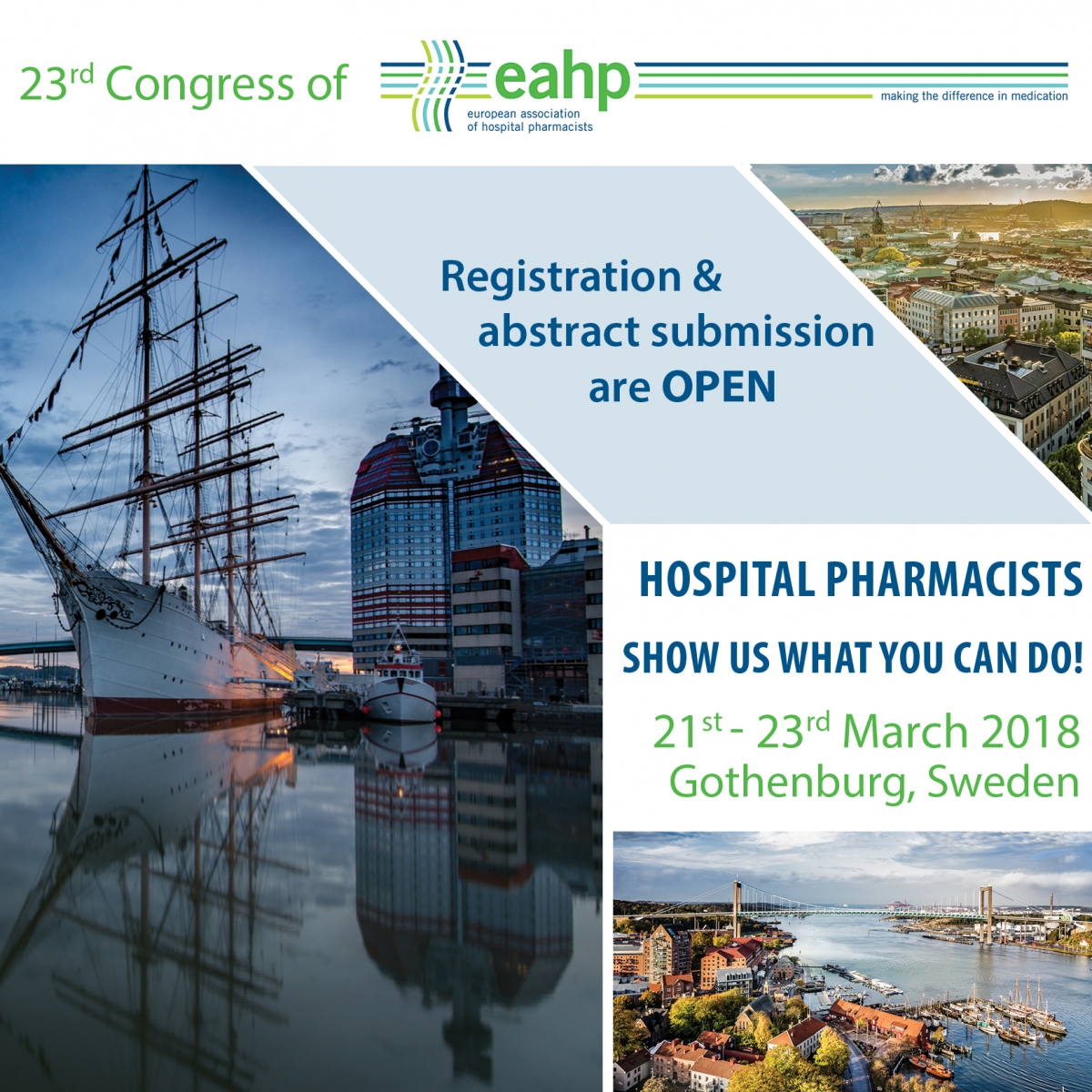
23rd EAHP Congress – registration and abstract submission open
Registration for Europe’s largest hospital pharmacy education event, the 23rd Congress of the European Association of Hospital Pharmacists (EAHP) is now open. From 21st to 23rd March 2018, hospital pharmacists will be gathering in Gothenburg, Sweden. In accordance with the theme ‘Hospital Pharmacists – Show us what you can do!’ the next EAHP Congress will focus on the challenges that economic restrictions and increased demands pose.
The EAHP Congress provides an opportunity to demonstrate what hospital pharmacists have achieved, to provide inspiration for future development and to energise us for the road ahead. This opportunity to showcase the benefits facilitated by hospital pharmacists will influence decision makers, multidisciplinary team members and patients to demand hospital pharmacists’ full engagement in the medication process.
Abstract submissions for the Congress are also open until a deadline of Saturday 15th October. Original contributions from all fields of hospital pharmacy are welcomed for poster presentation. The poster award nominees will be determined in November 2017 and provided with the opportunity to give an oral presentation during the congress.
For more information about registration and abstract submission check out the congress portal HERE
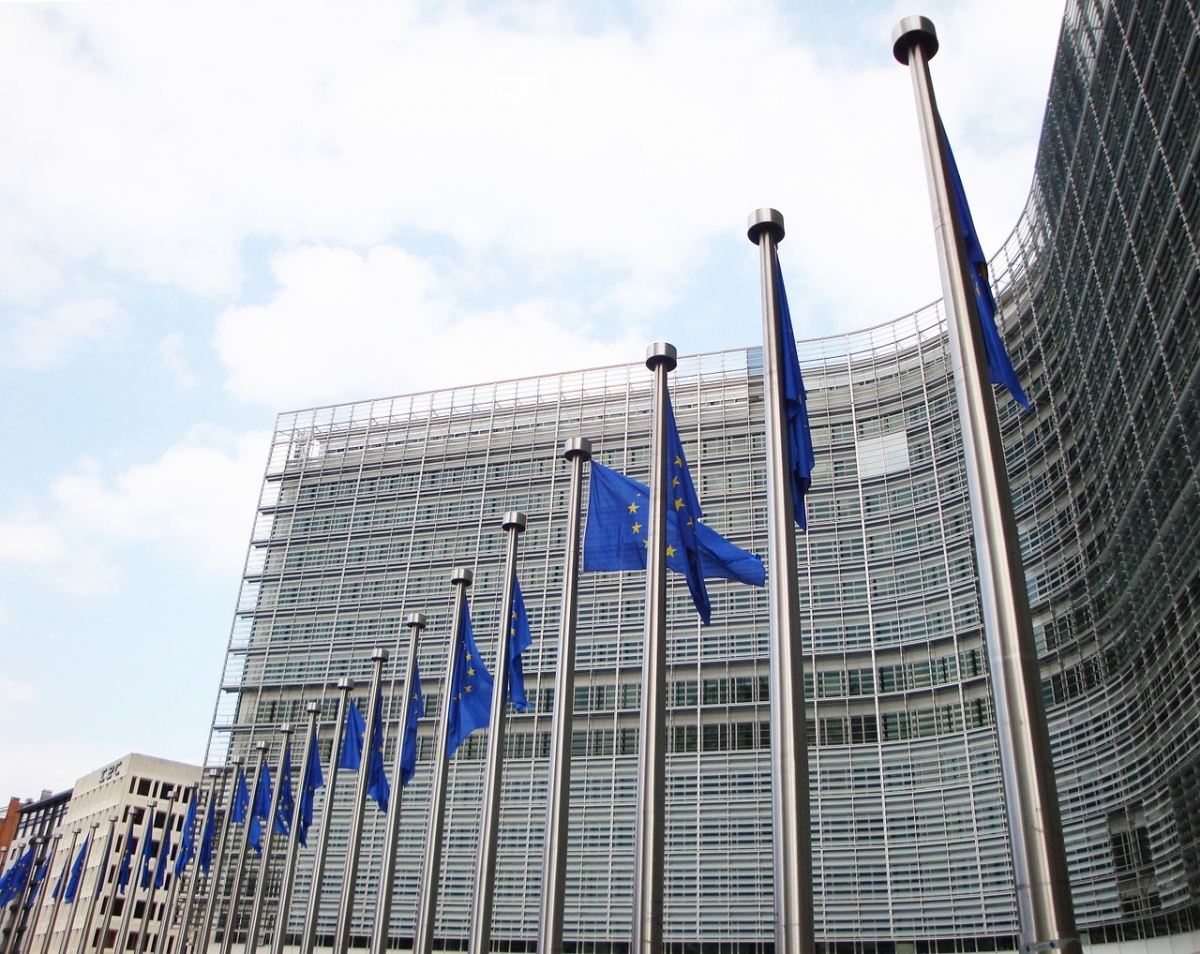
Commission expert panel tasked with the development of 3 new opinions
The Expert Panel on effective ways of investing in health of the European Commission has been tasked with the development of three opinions relating to pricing models for innovative medicines; access to healthcare in the EU and assessing the performance of health systems. The opinions should be presented in the second semester of 2017 as they will feed into further policy work of the European Commission.
The Expert Panel on effective ways of investing in health is an interdisciplinary and independent group. It was established by the European Commission to develop non-binding advice which aims to provide the necessary evidence that will support the EU countries in delivering high quality care and making their health systems more resilient and efficient whilst improving accessibility to all.
Opinion on innovative payment models for high-cost innovative medicines
Sustainability of health systems, patient access and affordability impact the development and the timely authorisation of innovative medicines. Since the European Commission is committed to ensure accessibility of patients to innovative medicinal products and interested in exploring possible synergies between various bodies in the EU it has tasked the Expert Panel with the drafting of an opinion on innovative payment models for high-cost innovative medicines.
The opinion should clarify methodologies and provide a tool for national competent authorities by identifying the gaps of current models and proposing areas for further develop for those authorities willing to increase their resilience. To this end the Expert Panel will
- analyse the current role of the national pricing and reimbursement authorities to improve access on innovative medicines, focusing on the scope to explore new ways of setting prices for specialty medicines in terms of improving access;
- answer the question of how health outcomes can be reflected on price setting, looking in particular to the role of RWD for innovative payment models; and
- elaborate on a theoretical framework of health system performance assessment in the area of pharmaceuticals.
Opinion on benchmarking access to healthcare in the EU
The recommendation that establishes the European Pillar of Social Right includes a principle on access to good quality preventive and curative health care. In order to guide the improvement of access to healthcare in EU Member States the Expert Panel has been asked to suggest quantitative benchmarks/targets on access to healthcare based on the unmet needs for medical examination indicators; to propose a qualitative benchmark, based on principles and policy levers and to discuss the possible utilization of EU funds and/or other mechanisms to support the improvement of access to healthcare.
Opinion on tools and methodologies for assessing the performance of primary care
The third opinion will focus on the primary care sector and evaluate how strong primary care can contribute to consolidating the overall health system’s performance. In this regard, the Expert Panel should provide views on dimensions and domains for assessing the performance of primary care and specific existing or new indicators for a better understanding of the performance of primary care.
In addition, it should determine how the analysed indicators are fitted for policy making and whether they allow the identification of specific levers and policy actions to respond to the highlighted issues. The findings should provide advice for an EU agenda on performance assessment of primary care and will also contribute to the work of the Expert Group on Health Systems Performance Assessment.
More information on the work of the Expert Panel is available HERE
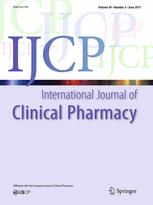
Pharmacists in Emergency Departments study published
The Pharmacists in Emergency Departments study analysed the future enhanced clinical role of pharmacists in England due to the concerns about maintaining appropriate clinical staffing levels in these departments. The findings of the study support the case for extending the clinical role of pharmacists.
The study investigated if Emergency Department attendees could be clinically managed by pharmacists with or without advanced clinical practice training. Pharmacist data collectors working in 49 sites in England identified patient attendance at their Emergency Department and recorded anonymized details of 18,613 cases. The findings were categorized each into one of four possible options: cases which could be managed by a community pharmacist; could be managed by a hospital pharmacist independent prescriber; could be managed by a hospital pharmacist independent prescriber with additional clinical training; or medical team only (unsuitable for pharmacists to manage).
Out of the recorded cases 726 (3.9%) were judged suitable for clinical management by community pharmacists, 719 (3.9%) by pharmacist prescribers, 5202 (27.9%) by pharmacist prescribers with further training, and 11,966 (64.3%) for medical team only. Overall, the study concluded that 36% of Emergency Department cases could potentially be managed by a pharmacist. General medicine and orthopaedics turned out to be the areas of greatest potential for pharmacist management.
The full report on the study is available HERE
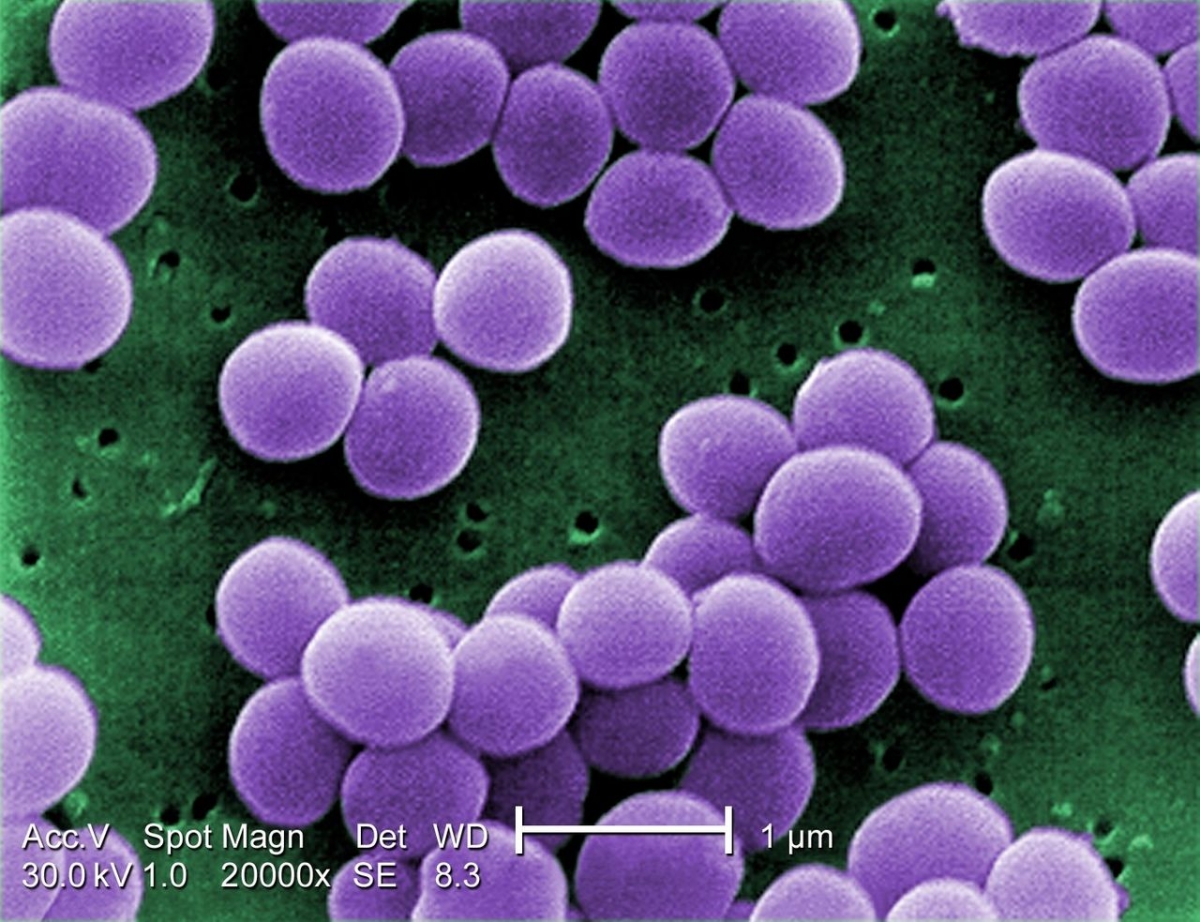 AMR: Joint Interagency Antimicrobial Consumption and Resistance Analysis
AMR: Joint Interagency Antimicrobial Consumption and Resistance Analysis
The second joint report on the integrated analysis of the consumption of antimicrobial agents and occurrence of antimicrobial resistance in bacteria from humans and food-producing animals was recently published by the European Centre for Disease Prevent and Control (ECDC), the European Food Safety Authority (EFSA) and the European Medicines Agency (EMA).
The report analyses data from 2013 to 2015 which was obtained through five different surveillance/monitoring networks managed by the agencies to collect annual data on the consumption of antimicrobial agents and the occurrence bacterial of antimicrobial resistance in both humans and food-producing animals in the EU/EEA Member States and in Switzerland. The presented results show that there are still important differences across the EU in the use of antibiotics in animals and humans. The situation varies depending on the country and on the type of antibiotic, but overall the use of antibiotics is higher in food-producing animals than in humans.
The conclusions of the second report are in line with those of the first report published in 2015. However, the increase of the number of countries reporting antimicrobial consumption data in both humans (30, previously 28) and food-producing animals (29, previously 26) allowed for a more sophisticated analysis due the availability of better quality data.
The experts of all three agencies concluded that reducing the unnecessary use will have an impact on the occurrence of resistance. They also recommended further research to better understand how the use of antibiotics and resistance affect one another.
Read the full report HERE
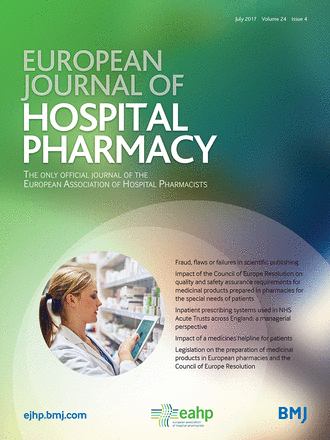 EJHP: Pharmacist-initiated deprescribing in hospitalised elderly
EJHP: Pharmacist-initiated deprescribing in hospitalised elderly
The online first edition of the European Journal of Hospital Pharmacy (EJHP) has published an original article which shows how hospitalisation presents an opportunity to re-evaluate the use of medications. The study analysed how deprescribing can help reduce polypharmacy in the elderly and looked at the factors associated with acceptance by physicians.
More HERE
————————————————————–

Consultations
EMA – concept paper on the need for the development of a reflection paper on regulatory requirements for the development of medicinal products for chronic non-infectious liver diseases (PBC, PSC, NASH)
Based on the need for further guidance, EMA would like to work on a reflection paper outlining requirements for the development of medicinal products for chronic non-infectious liver diseases. The consultation aims at determining the scope of this paper.
Deadline – 31st August
More information HERE
EMA – Clinical Data Publication Survey
The survey aims at collecting the views of the users of the clinical data website and gathering feedback on the usability of the website. The survey should take no more than 10 minutes to complete.
Deadline – 31st August
The survey is available HERE
European Commission – Stakeholder consultation for the evaluation of EU legislation on blood, tissues and cells
The purpose of this consultation is to support a comprehensive evaluation of the Union legislation on blood and tissues and cells – Directives 2002/98/EC and 2004/23/EC respectively and their implementing (technical) Directives, examining their functioning across the EU. In particular, the consultation aims to gather views on the extent to which the Directives have met their original objectives and whether they remain fit for purpose. The evaluation is expected to provide a sound evidence base which will be used to consider the need for any changes to the legislation.
Deadline – 31st August
More information HERE
Public Consultation on Health and Care in the Digital Single Market
The European Commission has launched a public consultation on transformation of health and care in the Digital Single Market. The consultation investigates the need for policy measures that will promote digital innovation for better health and care in Europe and feed into a new Policy Communication to be adopted by the end of 2017. Participation is open to citizens, patient organisations, health and care professionals, public authorities, researchers, industries, investors and users of digital health tools.
Deadline – 12th October
More information HERE

Upcoming events
7th September – EPHA 8th Annual Conference: Make Health Your Business
Brussels, Belgium
Despite the existence of a strong evidence base for effective policy action on health promotion and disease prevention too little has been achieved. Policy-makers already know what needs to be done to overcome barriers to good health so the focus of this conference will be to explore how new levers and different levels of power can break through to real action on chronic diseases – by making health everyone’s business.
26th September – EMA: Public hearing on valproate
London, United Kingdom
The hearing of the European Medicines Agency (EMA) is part of an ongoing review of valproate-containing medicines in the treatment of women or girls who are pregnant or of childbearing age. Those wishing to participate at the hearing, which will take place at the EMA offices in London, need to register in advance and may request to speak in front of the Committee or simply observe the proceedings. Those unable to attend the hearing in person can follow the live broadcast on EMA’s website.
1st October – 12th European meeting of Women Pharmacists
The 12th European meeting of Women Pharmacists will cover all pharmacy sectors with a focus on broadening horizons and knowledge. EAHP President Joan Peppard will be part of a workshop on career advancement that will focus on new roles and qualifications required in hospital pharmacy.
























 The EAHP EU Monitor is a regular round up of news relevant to hospital pharmacy in Europe.
The EAHP EU Monitor is a regular round up of news relevant to hospital pharmacy in Europe.


 AMR: Joint Interagency Antimicrobial Consumption and Resistance Analysis
AMR: Joint Interagency Antimicrobial Consumption and Resistance Analysis EJHP: Pharmacist-initiated deprescribing in hospitalised elderly
EJHP: Pharmacist-initiated deprescribing in hospitalised elderly